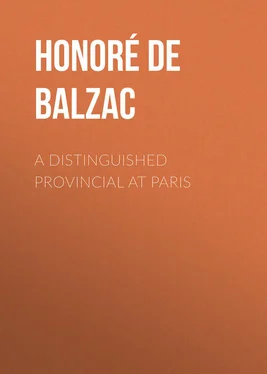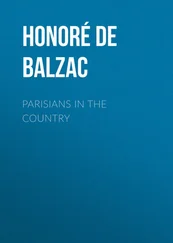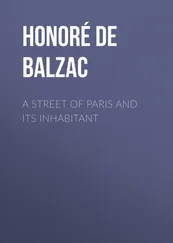Honoré Balzac - A Distinguished Provincial at Paris
Здесь есть возможность читать онлайн «Honoré Balzac - A Distinguished Provincial at Paris» — ознакомительный отрывок электронной книги совершенно бесплатно, а после прочтения отрывка купить полную версию. В некоторых случаях можно слушать аудио, скачать через торрент в формате fb2 и присутствует краткое содержание. Жанр: literature_19, foreign_antique, foreign_prose, на английском языке. Описание произведения, (предисловие) а так же отзывы посетителей доступны на портале библиотеки ЛибКат.
- Название:A Distinguished Provincial at Paris
- Автор:
- Жанр:
- Год:неизвестен
- ISBN:нет данных
- Рейтинг книги:4 / 5. Голосов: 1
-
Избранное:Добавить в избранное
- Отзывы:
-
Ваша оценка:
- 80
- 1
- 2
- 3
- 4
- 5
A Distinguished Provincial at Paris: краткое содержание, описание и аннотация
Предлагаем к чтению аннотацию, описание, краткое содержание или предисловие (зависит от того, что написал сам автор книги «A Distinguished Provincial at Paris»). Если вы не нашли необходимую информацию о книге — напишите в комментариях, мы постараемся отыскать её.
A Distinguished Provincial at Paris — читать онлайн ознакомительный отрывок
Ниже представлен текст книги, разбитый по страницам. Система сохранения места последней прочитанной страницы, позволяет с удобством читать онлайн бесплатно книгу «A Distinguished Provincial at Paris», без необходимости каждый раз заново искать на чём Вы остановились. Поставьте закладку, и сможете в любой момент перейти на страницу, на которой закончили чтение.
Интервал:
Закладка:
“It is a historical work, sir, in the style of Scott. The character of the struggle between the Protestants and Catholics is depicted as a struggle between two opposed systems of government, in which the throne is seriously endangered. I have taken the Catholic side.”
“Eh! but you have ideas, young man. Very well, I will read your book, I promise you. I would rather have had something more in Mrs. Radcliffe’s style; but if you are industrious, if you have some notion of style, conceptions, ideas, and the art of telling a story, I don’t ask better than to be of use to you. What do we want but good manuscripts?”
“When can I come back?”
“I am going into the country this evening; I shall be back again the day after to-morrow. I shall have read your manuscript by that time; and if it suits me, we might come to terms that very day.”
Seeing his acquaintance so easy, Lucien was inspired with the unlucky idea of bringing the Marguerites upon the scene.
“I have a volume of poetry as well, sir – ” he began.
“Oh! you are a poet! Then I don’t want your romance,” and the old man handed back the manuscript. “The rhyming fellows come to grief when they try their hands at prose. In prose you can’t use words that mean nothing; you absolutely must say something.”
“But Sir Walter Scott, sir, wrote poetry as well as – ”
“That is true,” said Doguereau, relenting. He guessed that the young fellow before him was poor, and kept the manuscript. “Where do you live? I will come and see you.”
Lucien, all unsuspicious of the idea at the back of the old man’s head, gave his address; he did not see that he had to do with a bookseller of the old school, a survival of the eighteenth century, when booksellers tried to keep Voltaires and Montesquieus starving in garrets under lock and key.
“The Latin Quarter. I am coming back that very way,” said Doguereau, when he had read the address.
“Good man!” thought Lucien, as he took his leave. “So I have met with a friend to young authors, a man of taste who knows something. That is the kind of man for me! It is just as I said to David – talent soon makes its way in Paris.”
Lucien went home again happy and light of heart; he dreamed of glory. He gave not another thought to the ominous words which fell on his ear as he stood by the counter in Vidal and Porchon’s shop; he beheld himself the richer by twelve hundred francs at least. Twelve hundred francs! It meant a year in Paris, a whole year of preparation for the work that he meant to do. What plans he built on that hope! What sweet dreams, what visions of a life established on a basis of work! Mentally he found new quarters, and settled himself in them; it would not have taken much to set him making a purchase or two. He could only stave off impatience by constant reading at Blosse’s.
Two days later old Doguereau come to the lodgings of his budding Sir Walter Scott. He was struck with the pains which Lucien had taken with the style of this his first work, delighted with the strong contrasts of character sanctioned by the epoch, and surprised at the spirited imagination which a young writer always displays in the scheming of a first plot – he had not been spoiled, thought old Daddy Doguereau. He had made up his mind to give a thousand francs for The Archer of Charles IX. ; he would buy the copyright out and out, and bind Lucien by an engagement for several books, but when he came to look at the house, the old fox thought better of it.
“A young fellow that lives here has none but simple tastes,” said he to himself; “he is fond of study, fond of work; I need not give more than eight hundred francs.”
“Fourth floor,” answered the landlady, when he asked for M. Lucien de Rubempre. The old bookseller, peering up, saw nothing but the sky above the fourth floor.
“This young fellow,” thought he, “is a good-looking lad; one might go so far as to say that he is very handsome. If he were to make too much money, he would only fall into dissipated ways, and then he would not work. In the interests of us both, I shall only offer six hundred francs, in coin though, not paper.”
He climbed the stairs and gave three raps at the door. Lucien came to open it. The room was forlorn in its bareness. A bowl of milk and a penny roll stood on the table. The destitution of genius made an impression on Daddy Doguereau.
“Let him preserve these simple habits of life, this frugality, these modest requirements,” thought he. – Aloud he said: “It is a pleasure to me to see you. Thus, sir, lived Jean-Jacques, whom you resemble in more ways than one. Amid such surroundings the fire of genius shines brightly; good work is done in such rooms as these. This is how men of letters should work, instead of living riotously in cafes and restaurants, wasting their time and talent and our money.”
He sat down.
“Your romance is not bad, young man. I was a professor of rhetoric once; I know French history, there are some capital things in it. You have a future before you, in fact.”
“Oh! sir.”
“No; I tell you so. We may do business together. I will buy your romance.”
Lucien’s heart swelled and throbbed with gladness. He was about to enter the world of literature; he should see himself in print at last.
“I will give you four hundred francs,” continued Doguereau in honeyed accents, and he looked at Lucien with an air which seemed to betoken an effort of generosity.
“The volume?” queried Lucien.
“For the romance,” said Doguereau, heedless of Lucien’s surprise. “In ready money,” he added; “and you shall undertake to write two books for me every year for six years. If the first book is out of print in six months, I will give you six hundred francs for the others. So, if you write two books each year, you will be making a hundred francs a month; you will have a sure income, you will be well off. There are some authors whom I only pay three hundred francs for a romance; I give two hundred for translations of English books. Such prices would have been exorbitant in the old days.”
“Sir, we cannot possibly come to an understanding. Give me back my manuscript, I beg,” said Lucien, in a cold chill.
“Here it is,” said the old bookseller. “You know nothing of business, sir. Before an author’s first book can appear, a publisher is bound to sink sixteen hundred francs on the paper and the printing of it. It is easier to write a romance than to find all that money. I have a hundred romances in manuscript, and I have not a hundred and sixty thousand francs in my cash box, alas! I have not made so much in all these twenty years that I have been a bookseller. So you don’t make a fortune by printing romances, you see. Vidal and Porchon only take them of us on conditions that grow harder and harder day by day. You have only your time to lose, while I am obliged to disburse two thousand francs. If we fail, habent sua fata libelli , I lose two thousand francs; while, as for you, you simply hurl an ode at the thick-headed public. When you have thought over this that I have the honor of telling you, you will come back to me. — You will come back to me !” he asserted authoritatively, by way of reply to a scornful gesture made involuntarily by Lucien. “So far from finding a publisher obliging enough to risk two thousand francs for an unknown writer, you will not find a publisher’s clerk that will trouble himself to look through your screed. Now that I have read it I can point out a good many slips in grammar. You have put observer for faire observer and malgre que . Malgre is a preposition, and requires an object.”
Lucien appeared to be humiliated.
“When I see you again, you will have lost a hundred francs,” he added. “I shall only give a hundred crowns.”
Читать дальшеИнтервал:
Закладка:
Похожие книги на «A Distinguished Provincial at Paris»
Представляем Вашему вниманию похожие книги на «A Distinguished Provincial at Paris» списком для выбора. Мы отобрали схожую по названию и смыслу литературу в надежде предоставить читателям больше вариантов отыскать новые, интересные, ещё непрочитанные произведения.
Обсуждение, отзывы о книге «A Distinguished Provincial at Paris» и просто собственные мнения читателей. Оставьте ваши комментарии, напишите, что Вы думаете о произведении, его смысле или главных героях. Укажите что конкретно понравилось, а что нет, и почему Вы так считаете.












